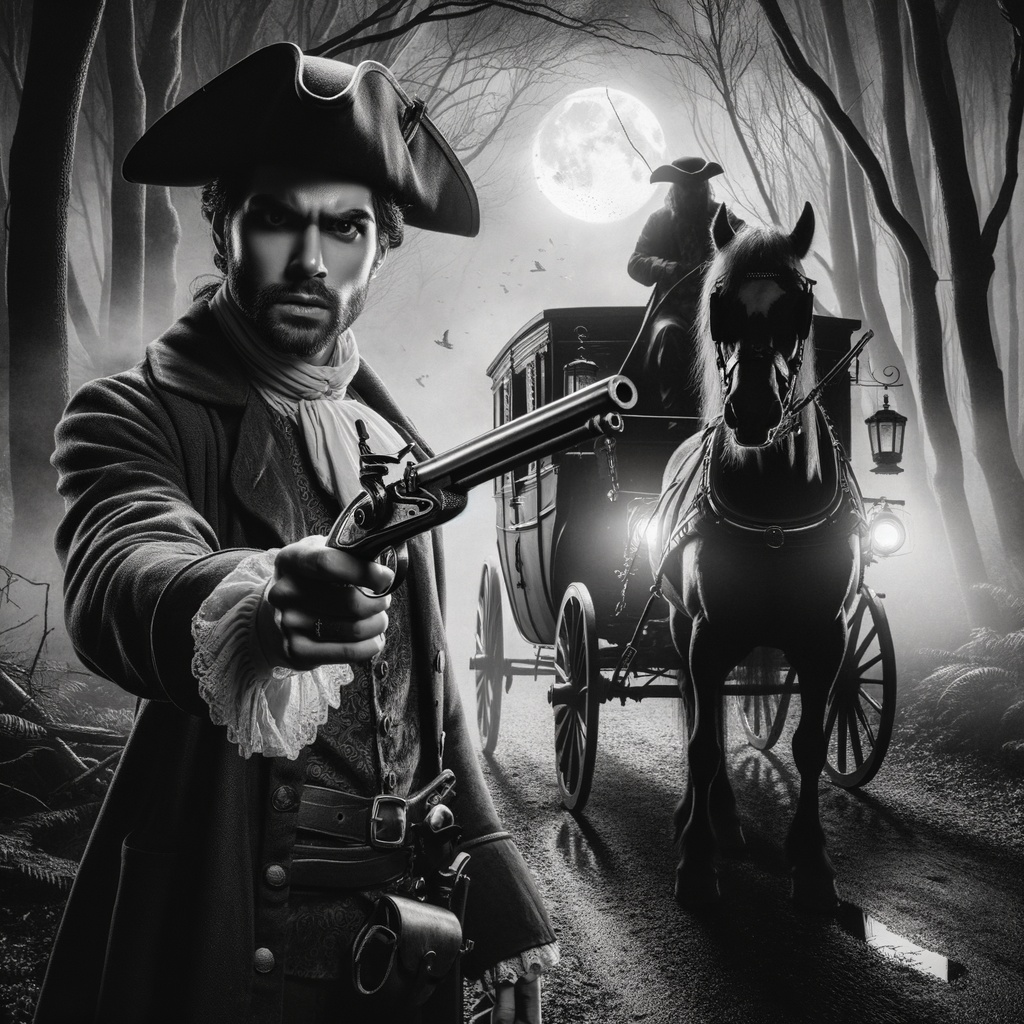William Buxton was the highwayman with a heart of gold. Or so he wanted two of his victims to think. Sadly for him, a moment of compassion was his undoing. On Sunday, June 29, 1777, Buxton held up a stagecoach eight miles out of the city of London on the Uxbridge Road.
“Stand and deliver! he shouted. But not quite loudly enough as the coach carried on. Galloping after it, he yelled louder. This time it ground to a halt. Inside were Elizabeth Fell and her daughter Harriot. Both out of their wits with fear. They had almost completed their journey from Southgate to Hanwell, west of London. Expecting to join the head of the household Solomon Fell in just a few minutes. Instead, they were looking down the barrel of Buxton’s gun.

Buxton – a handsome highwayman
Buxton was a good looking highwayman, about twenty years old. Very calmly, the dashing thief robbed Elizabeth and Harriot of their watches and purses. He gazed at the Guinea, Crown, and six Shillings in his hand. Not quite the bounty he had been hoping for. Looking back at the two ladies, Buxton asked if that was really all they had. Repeatedly, Elizabeth reassured him that was everything.
“Have you nothing to pay the turnpikes?” Buxton inquired. These were the regular toll gates that travellers on English roads encountered every few miles. Somewhere up ahead, he reckoned, there would be a turnpike where his two victims would have to part with some coin. But now, he had taken all their cash. The poor women might end up walking the rest of the way home. Well, that would never do!
The kind-hearted highwayman
The kind-hearted Buxton reached into the pockets of his breeches for a little silver to hand back. The ladies appreciated the fact he was very civil, didn’t swear, hadn’t stuck his pistol inside the coach as many highwaymen did (though they could see he was holding a weapon) and he had only asked for money and not their watches. Though in the initial state of terror, they gave him those items as well.
While Buxton was busy with his little act of charity, a footman, Richard Wright, pounced on him from behind the coach. He managed to wrest the pistol from his free hand. The other hand was still rummaging around in his pocket for spare change. Wright pointed the gun at Buxton: “Damn you, you’re a dead man.” And fired. But incredibly, the gun was not loaded.
At which point, the young highwayman bolted off. But the coachman, William Walker, and Wright the footman surmised that Buxton’s horse was a sad looking thing, an “errant jade”, they could outride. The Fell’s coach, in contrast, was drawn by two “spirited and powerful geldings”. So they went after him. One contemporary account claimed this high-speed chase terrified the two ladies, rattling around inside the coach, more than the robbery.
Buxton is captured
At Brent Bridge, they caught up with the highwayman. Buxton’s horse was tired and once it saw the river Brent, stopped for a drink. No matter how much the panicking thief dug his spurs into the animal and kicked it, the old nag wasn’t going to budge. Walker leaped down from the coach box and landed with full force on top of Buxton. Together with Wright, they subdued him.
Now he all about feeling sorry for himself. “Damn, I know I’m a dead man. I’m glad I’m taken. I could not have escaped long, and I may as well be hanged now as a few weeks hence.” Highway robbery, along with over a hundred other crimes in 1777, was a capital offence. Buxton knew that he would soon face a baying crowd as he swung with a rope around his neck, throttled for their entertainment.
Walker and Wright took their prisoner down to a pub called, appropriately enough, The Coach and Horses. They were joined there by Solomon Fell, who had got news of his wife and daughter being robbed. The local constables and a Justice of the Peace arrived as well. Buxton was searched and it was clear this was not the only robbery of the evening.
It turned out that the polite highwayman had been a footman himself and was still neatly dressed. But had turned to a life of crime for what he hoped would be easy pickings. On July 2, 1777, he went before Justice Nares pleading for mercy and saying it was his first offence. Unfortunately, Buxton was already a suspected highwayman. The sentence was Death.
DISCOVER: Unsolved Victorian murders!
The Highwayman escapes death – for a while
Solomon Fell requested mercy for Buxton, possibly on account of his good manners. And the ill-judged act of compassion that had led to his capture. Instead of being hanged, Buxton had his sentence commuted to imprisonment on one of the floating prisons in the river Thames. These were ships, or “hulks”, used for incarcerating criminals offshore. They were also used for transporting the condemned to Australia.
Those like Buxton imprisoned on these ships in the Thames were forced into hard labour that included dredging the river. It seems the highwayman escaped from one of the “ballast lighters” and went on the run. At some point he enlisted in the army and deserted. Then it was back to being a highwayman. He stole a large amount from a postal coach and this time he had not one, but a “brace” of pistols on him. All fully loaded this time!
But Buxton’s luck had run out. In July 1780 he was arrested. And there is a record from August 25, 1780 of a William Buxton being hanged at Derby for highway robbery of a certain, John Kennedy. I think we can assume the polite highwayman finally had his date on the scaffold.












